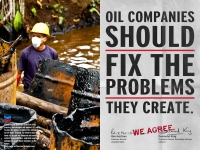Chevron Sues Its Own Shareholders In Ecuador Compensation Battle

U.S. oil giant Chevron's latest move in an epic legal battle waged against indigenous Ecuadorian villagers involves serving legal papers on journalists, a New York state government official, Google, Yahoo!, Microsoft, a host of environmental groups, and even its own shareholders.
Since 2011 Chevron has refused to pay nearly $19 billion in damages awarded by an Ecuadorian court to Amazonian residents who live in areas polluted by Texaco, a company Chevron bought. During nearly two decades of contentious litigation, the fourth-largest oil company in the world has appealed the ruling in Ecuadorian courts, attempted to block the Ecuadorian judgment in U.S. federal courts and more recently sued Steven Donziger, a lawyer for the plaintiffs, for racketeering.
Texaco in Ecuador |
Chevron claims that Donziger committed fraud in order to win his case in Ecuador. To search for evidence the company filed legal demands for information late last year on Internet service providers, dozens of environmental activists and NGOs, writers, lawyers, and others who say they were tangentially involved with Chevron's Ecuador case as well as some who appear to have no connection at all.
Chevron's subpoenas demand data that would show when and from where people logged into more than 70 private email accounts. Those caught in the dragnet include people who had exchanged email correspondence with Donziger over the time span of nine years: personal friends, bloggers and others. The subpoena does not ask for the content of the emails.
"Our case is about a massive fraud and extortion scheme for billions of dollars," said Randy Mastro, a lawyer representing Chevron in the case. "The conspirators enlisted a network of not-for-profits, so-called shareholders who were acting independently but really acting in collusion to get out their false story. We have a right to take discovery of those shareholders and those groups they enlisted to try to find out the methods of the scheme."
Last week a judge in a San Francisco federal court heard arguments to block these demands, presented by an attorney from the Electronic Frontier Foundation (EFF), a free speech and privacy rights group. The attorney, representing 32 anonymous clients who had been issued subpoenas by the multinational oil company, argued that Chevron's subpoenas were a harassment tactic meant to silence activists.
"This information would allow Chevron to create a virtual itinerary of who each individual has met with, and other potentially sensitive information implicating associational freedoms, which are protected by the First Amendment," Marcia Hoffman, the EFF attorney wrote in legal documents filed in October 2012, referring to the legal right to free speech.
"They just basically drag the net through these set of activists...and just basically [say], 'Let's get what we can and see what it turns up,'" said Jennifer Granick, the director of civil liberties at Stanford Law School Center for Internet and Society.
Chevron also subpoenaed Trillium Asset Management, a socially responsible investment company which owns a block of shares the company. Trillium sponsored several shareholder proposals at the 2011 company annual general meeting, including one that asked Chevron to nominate at least one independent environmental expert on energy issues to its board of directors. The proposal won around 25 percent of the shareholder vote. Chevron said the proposal was unnecessary and its current board's "qualification standards adequately recognize the importance of environmental expertise."
Trillium also wrote a letter to the U.S. Securities and Exchange Commission (SEC) in May 2011 asking the government entity to review whether Chevron appropriately disclosed the legal and financial risks posed by the lawsuits to its investors. The subpoena on Trillium asks for documents related to their shareholder proposals and communication records with the media about the proposals.
On this matter, the company has presented conflicting information about the impact of the $19 billion judgement. To shareholders, Chevron stated in its February 2011 annual report: "Because Chevron has no substantial assets in Ecuador, Chevron would expect enforcement actions as a result of this judgment to be brought in other jurisdictions. Chevron expects to contest any such actions."
On the other hand, Chevron presents the legal and financial threats to the company in Ecuador quite differently in its racketeering suit against Donziger. A week before the company's annual report was published, Rex Mitchell, deputy comptroller of Chevron, stated under oath: "Unless it is stopped, Defendants' announced plan to cause disruption to Chevron's supply chain is likely to cause irreparable injury to Chevron's business reputation and business relationships that would not be remediable by money damages."
Chevron also filed an ethics complaint against Thomas DiNapoli, the state comptroller of New York, who oversees the state's retirement fund. DiNapoli, who has sponsored proposals similar to Trillium's at shareholder meetings, has been publicly critical of the company's response to the Ecuador judgment. "The time for delay is over," said DiNapoli in May 2012. "The company's attempt to undo the court's verdict only keeps the case in the public eye and further damages Chevron's reputation. Chevron's actions are hurting shareholders as well as the indigenous people of the rainforest."
Chevron contends that DiNapoli, along with Donziger, have "orchestrated a scheme to extort a multibillion-dollar payoff from Chevron in connection with a fraudulent litigation against Chevron in Lago Agrio, Ecuador."
DiNapoli's office has said the accusations are baseless.
Experts say that it is not unusual for shareholders to request that companies hire an independent environmental expert to sit on a board, and asking the S.E.C. to review a company's disclosures is "fair game for shareholders."
But what is unusual is for a company to target the shareholders, said Timothy Smith, a vice president at Walden Asset Management, another socially responsible investment company .
"A shareholder making a legitimate appeal to the company doesn't deserve this kind of counterattack," he told the New York Times.
- 183 Environment



